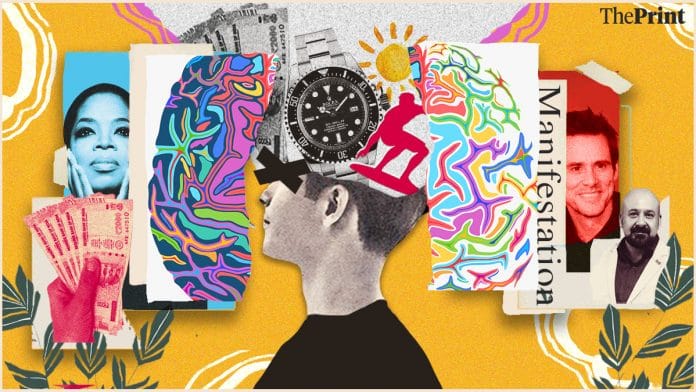Now that ‘manifest’ is Cambridge Dictionary’s word of the year, the social media generation has another justification for its delusions.
What originally meant bringing something into reality through focus and intent has been downgraded to the verbal equivalent of ‘abracadabra’ by Instagram influencers and TikTok gurus.
The new meaning is superficial, absurd, and downright annoying.
Social media has got people believing that if you want a mansion, a dream job, or a soulmate who looks like a Hemsworth brother, all you have to do is manifest it (think about it) every day and voilà.
Those who have made it big credit their wins to manifestation instead of sharing any practical advice. Their success stories are full-blown Bollywood dramas on social media—a 30-part series on how to get where they are by ‘journaling’ your dreams.
Manifestation has become a feel-good, zero-effort excuse for people to avoid putting in the work. It’s like expecting to win the lottery without buying a ticket.
But here’s the reality—you can’t speak or dream your life into existence. Manifestation has no role to play in your achievements or failures. Positive thinking is great, but sitting on your couch isn’t going to get you that promotion.
Also read: ‘Say yes to the universe, it says yes back’ — there’s a new manifestation industry in India
Rizz to stan
It’s not just manifestation that has got the dictionary nod of approval.
Gen Z language, and by extension the Gen Z school of thought, get a boost of legitimacy with ‘word of the year’ honours.
Words and phrases like ‘vibe’, ‘ick’, ‘bussin’, ‘drip’ and ‘tea’ have become part of everyday conversations for the online generation.
Despite being Gen Z, I’m unable to connect with this vocabulary. For instance, when one says tea, I think of the beverage but in the new lingo it means ‘gossip.’
We had just escaped textspeak—gr8 (great), 4U (for you), 10q (thank you), lyk (like)—and now there’s a fresh new vocabulary to learn if you want to keep up.
And, social media has had a fair role to play. With the global reach of platforms like Instagram, Snapchat and TikTok, words can go from obscure online jargon to widely recognised terms almost overnight.
The Oxford University Press’ word of the year has been steeped in internet culture for a few years now.
The term ‘Goblin mode’—embracing the comforts of depravity—was announced as Oxford University Press’ word of the year in 2022. This was followed by ‘rizz’ (charisma) in 2023. Cambridge had a better track record with ‘hallucinate’ (as in AI hallucination) in 2023 and ‘homer’ (the answer to a Wordle) in 2022.
And then there’s the Collins English dictionary—its word of 2024 was ‘Brat’. The shortlist included ‘brainrot’, ‘looksmaxxing’, ‘delulu’, and ‘yapping’.
With social media platforms encouraging fast-paced, informal, and often creative modes of expression, the words we use are radically evolving. These words and phrases also quickly move from the digital space to everyday life.
And evidently, what we look up in the dictionary has also changed.
Try talking to someone a generation below you and you’ll instantly notice the difference. And if you talk to someone two generations below, it’s almost like a different language.
Also read: Gen Z is living with peak uncertainty. It’s the loneliest age
Therapyspeak
Another major influence on Gen Z’s vocabulary is the increasing importance of mental health awareness. It manifests (the right way to use the word) as ‘therapyspeak’. Words like love bombing, breadcrumbing, gaslighting are all common parlance now. Then there’s doomscrolling, eco-anxiety and more.
These terms have risen to prominence as Gen Z navigates the pressures of a hyper-connected, anxiety-inducing world. Using the right words is the first step to identifying a problem, and I do give them brownie points here. You can’t deal with something until you know what it is.
Another quirk of their dialect is the art of ‘clipping’— cutting words into bite-sized bits.
Personally, it drives me up the wall, but hey, that’s the cool-kid code now — sus for suspicious and delulu for delusional.
Seriously though, how much effort are we really saving here? Does typing the full word truly cost you that much time?
It will take us some time to wrap our heads around this new language. But change is the only constant and it’s time to ride the wave. Maybe it’s time to manifest myself a new dictionary to keep up.
Views are personal.
(Edited by Theres Sudeep)






